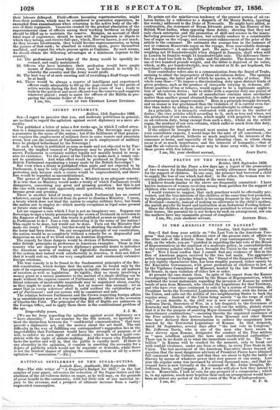SECRET DIPLOMACY.
Belfast, 15th September 1856. SIR—I regret to perceive that you, and moderate politicians in general, are inclined to regard the agitation against secret diplomacy as a mere ab- surdity.
You published a letter of mine a few weeks ago, in which I called atten- tion to a dangerous anomaly in our constitution. The Sovereign may give a guarantee in the name of the nation ' • but if the fulfilment of that guaran- tee requires the employment of military force in some remote and uncertain event, how can the consent of Parliament to such employment of military force be pledged beforehand by the Sovereign ? If such a treaty is published as soon as made and not obected to by Par- liament, the implied consent of Parliament may be pleaded; but if it is secret, Parliament is certainly neither legally nor morally bound to recog- nize its existence. Yet the power of the Crown to make such a treaty can- not be questioned. And what effect would be produced in Europe by the British Parliament repudiating a treaty made by the British Sovereign ?
But even when a treaty is published when made and not objected to by Parliament, it may be very objectionable ; and Parliament may refrain from protesting only because such a course would be unprecedented, and there- fore would be regarded as unconstitutional. The power of Parliament to dismiss a Ministry is no adequate remedy. It is true that no Ministry would make a treaty of which Parliament would disapprove, concerning any great and pressing question : but this is not the case with remote and apparently small questions, which may hereafter become great and pressing.
There is another kind of treaty over which Parliament has no control whatever, except that derived from its power to dismiss a Ministry. I mean, a treaty which does not bind the nation to employ. military force, but binds the nation not to employ it—which merely recognizes as legal some present or future state of things.
Let me suppose a case which I fear is not an imaginary one. Suppose our Sovereign to sign a treaty guaranteeing the crown of Denmark in reversion to the Emperor of Russia, and this treaty is published as soon as signed : what is Parliament to do ? Pass a vote disavowing it in the name of the nation ? This ought to be done, but would not be done. Turn out the Ministry that made the treaty ? Possibly ; but this would be shutting the stable-door after the horse had been stolen. On any recognized principle of our constitution, the nation would be as completely without a remedy for so disgraceful and dangerous an act as if we lived under an Austrian despotism. The remedy for these dangers would be obvious if Reformers would con- sider British principles in preference to American examples. Those in this country who are opposed to secret diplomacy generally desire to introduce the American system of making all diplomatic documents public : but if the system does indeed work satisfactorily in America, it does not follow that it would suit us, with our very complicated and enormously extensive foreign relations. The true remedy is to be found in the fundamental principles of the Bri- tish constitution, which declare that the nation can be bound only by the acts of its representatives. This principle is rigidly observed in all matters of taxation as well as legislation. So rigidly, that no treaty involving a money grant or a money guarantee to the amount of a single shilling can be made without the express consent of Parliament; while territorial and po- litical interests of incalculable magnitude may be negotiated about, exactly as they might be under a despotism. Let us remove this anomaly : let us enact that no treaty whatever shall be valid without the ratification of an act of Parliament; and our system will be consistent and safe. The relation between Parliament and the Crown respecting foreign affairs is as unsatisfactory now as it was respecting domestic affairs at the accession of Charles the First. The principles of the Bill of Rights are unknown in the Foreign Office, and to apply them there is the constitutional problem of the age.
Respectfully yours, J. J. M. [We are far from regarding the agitation against secret diplomacy as a " mere absurdity." In our number for the 6th instant, we specially no- ticed the distinction between the " confidential communication" that may precede a diplomatic act, and the secrecy about the act itself. The one culty in the way of fulfilling our correspondent's suggestion lies in the improbability that Parliament would have the strength of purpose, or of will, to enforce its own right of ratification; which is indeed quite con- sistent with the right of statute-making. And the reason why Parliament lacks the motive and will is, that the public is equally inert. If there is any absurdity in the agitation, it consists in asserting the necessity for a degree of publicity which would not be requisite or desirable, while there is not the faintest chance of altering the existing system at all by a mere agitation or "association."—En.]


























 Previous page
Previous page